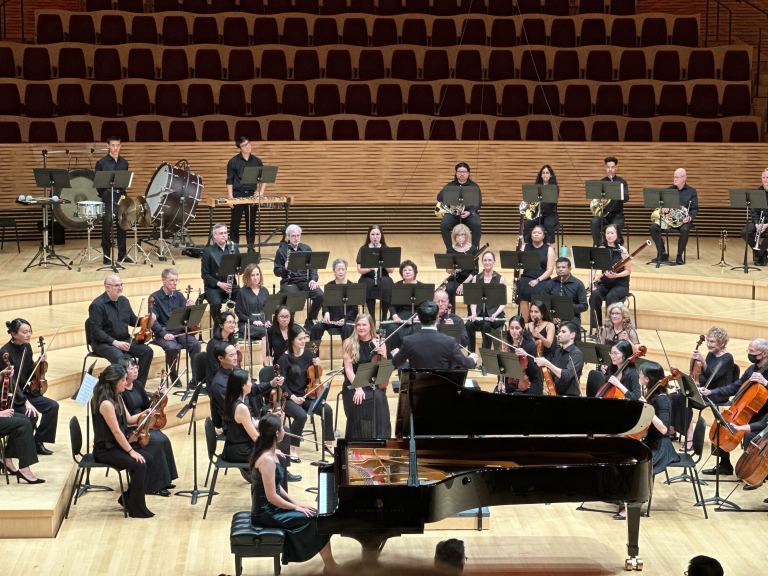Editor’s Note: This article is a review and includes subjective opinions, thoughts and critiques.
As if being a doctor — or studying to be one — isn’t enough of a testimony to talent, the Stanford Medicine Orchestra and School of Medicine affiliates demonstrated their musical excellence through the annual “Medicine & the Muse” Student Symposium on Wednesday.
The evening began with a series of individual and ensemble performances — smaller doses to ease the audience into the night. The beauty of these pieces was already enough to make my heart full, embodying the theme of the performance: “Pulling at Heartstrings.”
A quartet of graduate and undergraduate students played Mendelssohn’s “String Quartet No. 2 in A Minor,” sensitively weaving a tapestry of angsty and melancholic musical shades. In contrast to the solemn quartet, assistant professor of medicine Jonathan H. Chen also captivated the audience with a humorous magic show, expressing gratitude to the Stanford Medicine community for being “the real magic” that night.
The string of smaller-scale performances ended with an unbelievable display of skill on the cello by Melanie Ambler M.D. ’25. Returning the atmosphere to one of pensiveness, Ambler’s solo was the best of the symposium that night.
When Ambler walked onstage in a sunset-yellow dress and first introduced us to her cello, Shirley, I thought we would hear a joyful, light-hearted solo. However, the story she told through her improvised piece was much more complex.
Ambler spoke of a patient whom she met on her rotations, a fellow musician who’d gotten in a motor accident and was worried he could not play music again. On the day she decided to bring her cello in and play for the patient, his IV machine was malfunctioning with incessant alarms. To recreate this scene, pianist Aaron Wilk Ph.D. ’22 M.D. ’24 mimicked the rhythm of the IV alarm, playing the repeating motif on the musical note B.
As Wilk’s playing embodied just how annoying the alarm’s beeping was for the patient, Ambler set her bow on string and utterly transformed the scene. The backdrop of the IV alarm became a steady base note for the sweeping, melancholic chords and phrases that Ambler teased out.
The melody she composed appeared simple — free from fast-moving adrenaline swirls or catchy swing tunes. But her improvisation spanned the entire fingerboard, plumbing the solid depths of the C string as well as the ethereal upper register. Ambler imbued her improvisation with a deeply personal and touching quality, turning the irritating noise of a broken alarm into something magical. No wonder the patient lay in tears at the end of it — we all did.
After the intermission, the Medicine Orchestra took the stage, conducted by music director Terrance Yan. The ensemble performed to deliver on a simpler yet equally noble goal: exploring the range of human feeling.
Gershwin’s “Rhapsody in Blue” stood out right off the bat for its rapturous clarinet solo. I leaned forward in my seat for the whole piece, eager to hear what jazzical wonders the next bars would entail.
The piece featured an impressive solo from pianist Vivian Lou ’19 M.D. ’24. Lou’s performance ran the gamut of musical expression from the piano’s light, enigmatic trills to the grounding intensity of the bass chords. The symposium centered around how life-affirming music can be, and the performance certainly reflected the majestic highs and grave lows of life.
Leroy Anderson’s “Irish Suite” was also fun and boisterous to listen to. The Orchestra demonstrated their versatility with smooth alternations between bouncy jigs and sweet, pining melodies.
I most enjoyed the third movement, which featured affiliated clinic instructor of anesthesiology and concertmaster Lynn Gerber ’10 performing a violin solo. The lush, layered textures created a magical atmosphere resembling the opening of a Disney movie, and Gerber’s yearning expressiveness encapsulated the feeling of a heroine’s “I want” song.
For the Medicine Orchestra’s program as a whole, I would have appreciated some more slow and contemplative pieces. The ensemble’s repertoire felt very triumphant, aside from the nostalgic melodies in “Irish Suite.”
While humanity is certainly something to celebrate, the Orchestra could have drawn more inspiration from Ambler’s improvisational capstone and touched more on the emotional nuances of what it means to be human. Ambler’s cello improvisation mixed in the supreme combination of longing, worry and hope; the Orchestra’s performance would have benefited from pieces that continued this thread of sentimentality.
Regardless, the musicians proved that they don’t only have what it takes to save lives — they can also play life-affirming music.
